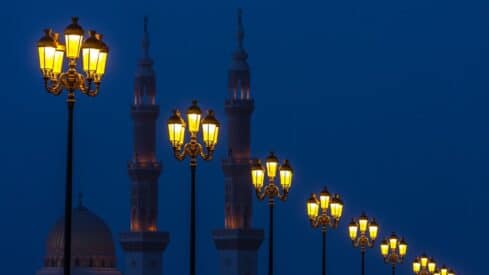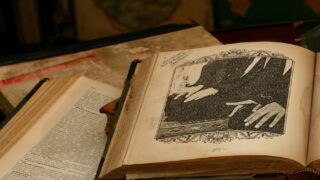‘Eid Mubarak!
Regardless of whether you prayed Salat’ul ‘Eid on Monday or Tuesday, today (Wednesday) is still one of the days of ‘Eid and so, it is a day of celebration for all Muslims.
While the khutbah of Salat’ul ‘Eid is meant to be a source of inspiration that provides us with valuable reminders, unfortunately, it becomes the part of the ‘Eid day that receives the least attention. People rush to the prayer hall, pray the ‘Eid prayer, and then either rush back to work or to join their friends and families for the celebration.
The khutbah gets squeezed in between the salah and the celebration; however, it contains some very salient reminders that we need to take note of in order to improve our individual, family, and community lives.
Prophet Muhammad (SAW) performed the hajj in the 10th year after the hijrah, and at various stations of the hajj, he delivered small reminders that deal with respect and honor for women, unity and brotherhood, and holding on to our sources of guidance. These reminders are collectively known as his last khutbah, delivered on the 9th day of Dhul Hijjah, on the mount of ‘Arafah.
We offer these reminders in this article:
Respect and Honor for Women
Today, perhaps one of the most neglected areas of our family and community life is our collective treatment of women who, after all, are our mothers, grandmothers, aunts, sisters, wives, and daughters. Yet, despite all of the daily sacrifices they make to fulfill these roles (as well as the duties and obligations they may encounter within their careers and professions), we often take their treatment very lightly.
It is unfortunate that boys are not taught better, and at an early age, how to respect and to honor the women in their families and community. And that, in many instances, women are not taught to expect respect and honor. However, long before the birth of Prophet Muhammad (SAW), it was the Jurhum tribe’s honorable and noble treatment of Hajar (may Allah be pleased with her) that allowed her to maintain control of the well of Zam Zam and the area surrounding the Ka’abah.
Hajar was alone with her baby, Ismail (Alayhi Salaam), and could have easily been disrespected and pushed aside so that the tribe could have access to the well, but she stood her ground with great nobility and, in doing so, she evoked honor and respect in the men of the tribe of Jurhum.
Today, for the most part, neither men nor women remember nor abide by the guidance of the Qur’an or the teachings of Prophet Muhammad (SAW). And so it is appropriate that we remember these words of the Prophet regarding the women in our families and community:
“O People, it is true that you have certain rights with regard to your women, but they also have rights over you. Remember that you have taken them as your wives only under God’s trust and with His permission. If they abide by your rights, then to them belongs the right to be fed and clothed in kindness. Treat your women well and be kind to them for they are your partners and committed helpers. And it is your right that they do not make friends with anyone of whom you do not approve, as well as never to be unchaste.”
On Unity and Brotherhood
The Muslim community has reached a point whereby we are being tested with the reality of living, working, worshipping, socializing with, and even marrying Muslims from all backgrounds. Our very diverse communities are comprised of Muslims of different races, ethnicities, nationalities, educational backgrounds, and socioeconomic statuses.
Our masajid are microcosms of the diversity that exists within our community; however, time and again, we hear of how, rather than making the most of this diversity, Muslims are dividing themselves based on factors that have no support in the Qur’an or the teachings of Prophet Muhammad (SAW).
With regards to our diversity, a verse in Sura Al-Hujurat (49:13) is often quoted in which Allah (SWT) addresses all of mankind, “O mankind, indeed we have created you from a male and a female, and divided you into nations and tribes, so that you may know each other. Indeed, the best of you in the sight of Allah is the one with the most taqwa.
Regardless of this eloquent reminder, we can witness disheartening in-fighting and separatist movements within the Muslim community along racial, ethnic, or socioeconomic lines. Not only have we divided along these artificial lines, but also we have violated norms of brotherhood, sisterhood, and co-existence.
Again, it befits us to seek a reminder from Prophet Muhammad’s (SAW) last khutbah:
“All of mankind comes from Adam and Eve. An Arab has no superiority over a non-Arab, nor does a non-Arab have any superiority over an Arab; also, a white has no superiority over a black nor does a black have any superiority over a white – except by piety and good action.
“Learn that every Muslim is a brother to every Muslim, and that the Muslims constitute one brotherhood. Nothing shall be legitimate to a Muslim that belongs to a fellow Muslim unless it was given freely and willingly. Do not, therefore, do injustice to yourselves. Remember, one day you will meet Almighty Allah and answer for your deeds. So beware and do not stray from the path of righteousness after I am gone.”
Our Sources of Guidance
Regardless of how scientifically, technologically, and medically advanced we become as a society, our sources of guidance must not change.
Muslim civilizations have risen, and fallen, across the world. Wherever and whenever they (we) fell, it was because their members (we) were not heeding the guidance of the Qur’an and the teachings of Prophet Muhammad (SAW). Wherever and whenever they rose, it was because as Muslims, they (we) were implementing the letter and the spirit of the Qur’an and the teachings of the Prophet.
Muslims in America are confronted with living in the land of, on the one hand, a self-appointed “super power” that is, on the other hand, morally and spiritually devastated. We owe it to ourselves and to the people around us to revisit our sources of guidance.
It is only when we truly begin to conduct our individual, family, and community affairs according to the teachings of the Qur’an and Prophet Muhammad (SAW) that Muslims will become a moral and spiritual force to be reckoned with and emulated. In that spirit, we end this article with the guidance provided by our beloved Prophet Muhammad (SAW):
“O People, no prophet or messenger will come after me and no new faith will be born. Reason well, therefore, O People, and understand the words that I convey to you. I leave behind me two things: the Qur’an and my Sunnah, and if you follow these, you will never go astray. All those who listen to me shall pass on my words to others, and those to others again; and may the last ones understand my words better than those who listen to me directly. Be my witness, O Allah, that I have conveyed Your message to Your people.”
By Altaf Husain


















